Julia Buchanan, Ph.D., ACSM-EP, EIM, and Zakkoyya H. Lewis Ph.D., ACSM-EP, EIM |
Oct.
9, 2023
 The ACSM Health & Fitness Summit and ACSM Regional Chapter meetings are great opportunities for exercise science and sports medicine students of all stripes, whether undergrad or graduate, to expand their horizons in their chosen field.
The ACSM Health & Fitness Summit and ACSM Regional Chapter meetings are great opportunities for exercise science and sports medicine students of all stripes, whether undergrad or graduate, to expand their horizons in their chosen field.
But of course, it isn’t always easy to get students to commit to events like these. For one, students have busy schedules already, and adding something else to the calendar, especially something that requires travel and an overnight stay or two, can seem daunting.
For another, it’s tough to miss out on your other courses. And then there are the financial considerations involved.
But none of this is insurmountable. Faculty members Julia Buchanan, Ph.D., ACSM-EP®, EIM and Zakkoyya H. Lewis Ph.D., ACSM-EP®, EIM, offer up some helpful tips for getting your students onboard.
1. Tie meeting attendance to one of your courses. At her university, Dr. Buchanan is able to offer a one-credit-hour special topics course. Counting toward elective credit, this course requires students to attend a meeting and then complete a suit of related assignments based on their conference experience. For her part, Dr. Lewis has students choose a topic to research further based on one of the presentations they attended.
2. Provide a letter of absence for their other classes. Your students might feel intimidated by the idea of telling their other professors they’re going to miss class. Giving them a letter (on official letterhead) explaining why they’re going to be absent, where they’re going, and why it’s important for their educational trajectory can go a long way.
3. Given them all the advance notice in the world. Some students are type A, on-the-ball people who jot down everything and constantly organize and reorganize their calendars. But many others are a little more lax. The earlier you can make your classes aware of an upcoming event — and continually remind them of its approach — the better. This isn’t just important for scheduling purposes — often, early registration confers benefits like reduced attendance fees.
4. Hold an information session early in the semester. Instead of just mentioning the conference in class, it might be helpful to actually spend a chunk of time at the beginning of the semester talking about why these meetings are important — from the simple experience of seeing a professional conference to rubbing shoulders with peers and colleagues to actively making career-forwarding connections.
5. Hold regular group meetings before the event. Dr. Buchanan notes, “Leading up to the conference, students must attend several group meetings that outline the course expectations and assignments that they will need to complete after the conference. The meetings also discuss expectations and tips for attending a professional conference (since this is a first for many of them). This is also a great way for the students to start to get to know one another before the trip.”
6. Offset the cost of attendance. As stated in tip No. 3, getting the word out early about meetings can give your students a chance to take advantage of early bird registration savings. But there’s more you can do to make things affordable, from asking your department or the university at large if they would be able to cover some of the registration fees and travel costs, or provide university transportation. Another option is to see whether your program’s student org would be interested in fundraising.
But once you’re at an event, or after you’ve attended one, what then? Drs. Buchanan and Lewis suggest a number of options. One, remember that this is also a marketing opportunity for your program — take photos and videos to showcase what your students experience. Sharing the highlights of your trip with ACSM, your colleagues, and your school is a great way to get noticed.
Two, consider holding a recap session where students can share their take on the presentations they attended. You can even formalize this a bit. As Lewis notes, “After the conference, students were required to give presentations that summarized their experience at the conference. Establishing conference attendance as a course requirement forces students to take advantage of the opportunity to learn from and network with others in the field.”
Hopefully you’ve found these tips helpful—we look forward to seeing you and your students at the next ACSM event!